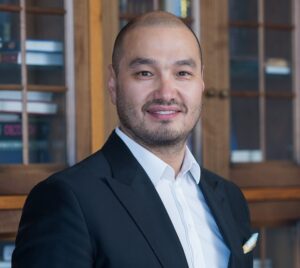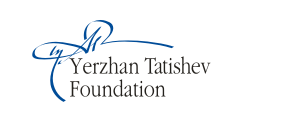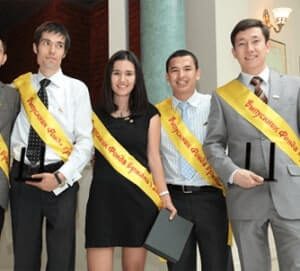Yerkin Tatishev: Education is not a «crust», but the ability to build one’s life
 Yerzhan Tatishev Foundation’s Board of Trustees’ Chairman and founder of the High Tech Academy private school shared with Forbes.kz his vision of how to get secondary education out of the crisis.
Yerzhan Tatishev Foundation’s Board of Trustees’ Chairman and founder of the High Tech Academy private school shared with Forbes.kz his vision of how to get secondary education out of the crisis.
Yerkin Tatishev is a large entrepreneur, owner of a diversified group of companies Kusto Group with assets in 10 countries. The field of education has for many years occupied an important place in his life. For 15 years, the Yerzhan Tatishev Charitable Foundation has been giving grants to talented graduates for admission to higher education. In 2017, Yerkin founded the High Tech Academy, which applies Finnish and project (Project Based Learning) teaching methodology. High Tech Academy has successfully completed its third academic year and is preparing to move to a new building designed by Finnish architects. Forbes.kz asked Yerkin Tatishev about the reasons for the recent failures of Kazakh education – the decline in international ratings, the lack of readiness for online education, «educational migration» – and about how the situation could be corrected.
F: Yerkin Nureldaemovich, what do you think is the reason for the not-so-successful online training announced for the quarantine period?
-The online education system is not ready and teachers have not been trained for it (technically or methodologically). If teachers are not constantly trained to learn new technologies, if there is no convenient online platform, if technology is not part of the learning process, then it is pointless to wait for results. The High Tech Academy moved quickly to full-fledged online learning, as they were already using basic tools (Google Classroom, online platforms for learning mathematics, foreign languages, and programming) in-person work, both teachers and students. And that’s from the first grade. New technologies are integrated into all subjects, and from the first days our students learn to apply technology to learning. Technology enables teachers to create and implement individual learning plans. According to a survey of parents, 90% praised the quality of distance learning at the High Tech Academy. We are ready to share this experience with anyone, and complete information, including lesson plans, is already available on hta.kz.
F: The Minister of Education and Science explained the poor results of the PISA tests with technical problems, such as the first computer-based assignment. What kinds of trends do you observe based on the Yerzhan Tatishev Foundation’s work and during the participation on the Board of Trustees of AlmaU?
– We’ve really rolled back a lot in the secondary education; we took the 69th place in the PISA rankings (in science and reading – F). However, there are only 78 countries, the numbers are tragic.
Every year, several hundred applicants apply for grants to our foundation, and we have noticed that in 15 years of operation, the quality of applicants has seriously declined, in so doing; students have come to school with a strong academic base, with an entrepreneurial character.
I believe that what is needed now is a real overhaul of educational programmes, and that we need to work across society, and it’s pointless to just nod at the Ministry. If we continue in this way, we will have an ignorant population, we will have graduates who at the age of 18 have the skills of 15-14 year’s old students, and it will be very challenging for us to compete with other countries. The wall of social problems will increase because education is not a «crust», it is the ability to think, analyze, solve complex problems, and understand how to build your life.
Now in both education and business, people should know how to create new solutions based on the information, new knowledge – that’s the kind of people that will be at the crest of the wave. Not just to be a consumer or even an analyst of information – these functions will now be transferred into the realm of artificial intelligence, computer programs. And the ability to use information, which is now abundant and free, to formulate the right questions and solve the real problems is what the new school is all about. Her job is to teach it, to give it the key to life. Children from such a school will always find something to do, will know how to find a way to solve any problem, from personal to public.
The world is now witnessing increasing turbulence, with sharp changes in the exchange rates, prices of oil and other resources, epidemics, political and economic crises, and more and more. One uncertainty begets another, it must be accepted as part of life – there will be no stability. We need not only to survive these storms, but to create, to move from survival to creation, and to do so, we need to have the right quality education.
The foundation for quality education is primarily social and emotional learning (SEL). Research shows that SEL not only improves academic performance but also improves future income compared to students who have not been trained in these skills. From the first days we introduce this approach into the NTA and hear only positive feedbacks from pupils and parents. Moreover, if the education system is about teaching our children how to be successful in this ever-changing world, it is not about comparison with any standard. When they are in school, children can understand their true hobbies and relate their future profession to what is really important and interesting for them.
Permanent tests and examinations (such as content and term summative assessments) should be abandoned and teachers should be trained in new formative evaluation methods based on recent research on how people learn. First of all, people should understand why they need to learn new material (today’s generation of children is called WHY Generation) and there should be a qualitative, motivating feedback from teachers/mentors to improve future outcomes, not a grade for a job the student can’t do. All progressive education systems, including Finnish education, are based on these principles. A few years ago, I met with the Deputy Minister of Education of Singapore, and he shared their new motto: Teach Less Learn More. It is very similar to the rule for teachers in the High Tech Academy: It’s not about what you teach, it’s about what they learn – «The main thing is not what the teacher teaches, but what the student eventually learns».
F: Maybe business skills should be taught later in university rather than in school?
-In a discussion organized by the Aspandau Foundation, the Minister of Education said that the universities need to develop soft skills – critical thinking, communication, teamwork, public speaking, presentation skills. From my point of view, it is a little late to teach soft skills to 18-year-olds, the basis for these skills should be laid during school as one of the learning outcomes. It’s especially about critical thinking, understanding different points of view, not looking at any idea as an axiom.
In case of higher education, a good university should be the source of the intellectual life of the city. We don’t have a university like that yet. I was at the Oxford University – where the university is constantly involved in the life of the city in terms of intellectual content, organizing a huge number of open lectures, conferences where all the residents of the city can participate. These universities are in constant contact with society. And I think our higher education system needs to do that, too.
For instance, students of the business faculty are not involved in small and medium-sized businesses, either in practice or in support. I’m sure that many owners of small cafes or other small businesses would be happy to get help – on auditing, marketing, how to cut costs, how to run an Instagram campaign, how to design a site, or how to do a mystery shopping. Students could have gained an experience and see the real business works, find out what the problems are, how to do accounting. Many entrepreneurs don’t have an economic education, they don’t know any new tools of business, and they always miss something. I’m sure the SMB needs that kind of help and the students need that kind of practice.
F: The method «teaching in practice» seems to relate to the method of project education in schools.
-A school operating on the principles of project education prepares children for a real life, develops in them what is called «citizenship». The projects that students are involved in are connected with the life of their city. They develop a habit not to live in the «aquarium», receiving knowledge from textbooks, and to solve real problems of their city, district, and community. They become citizens of the locality where they live, creating deep affection and a vibrant patriotism.
Nowadays, schools don’t have tendency to discuss what happens to the garbage, to the air in the city, to people’s relationships, how people live in different neighborhoods – it’s like parallel lives. But life in the «aquarium» is not the best experience for children. They’ll come into real life – and there will be many things on that they don’t have their own points of view, they haven’t even encountered. And they need to touch it, find out how to tackle with it. I think that it is the one of the ways where the education system should follow. There are a lot of changes to do that, but it’s solvable. I do not think that there are things in Kazakh education that are not negotiable; the main thing is to set the task correctly. But to say now – you, Mon, let’s solve this problem – it won’t work. Here, all sectors of civil society must work together, through dialogue, within a framework of shared responsibility.
For example, we are ready to share our experience and working methods with teachers and other school authorities. At the end of this year, together with our partner Korda Institute for Teaching, we will launch a program to train teachers in project methodology. The author of the program is Doris Korda, with whom we have been cooperating for more than four years. She holds annual trainings for teachers at the High Tech Academy and is our strategic advisor on school development and curriculum development, and she is the chair of the school’s board of trustees. We are convinced that the introduction of the project method in public and private schools will significantly increase the motivation of children to learn and enable them to really learn the skills of the twenty-first century.
F: But we have an overwhelming number of secondary schools – State schools, in which everything is determined by the Ministry of Education: budget, programs, premises, schedule, etc. The Ministry of Education and Science is responsible for all of this. How can ordinary citizens influence MES decisions?
-I strongly believe that only private education can create a best practice, sift through new programs, and contribute the grain from which new education will grow.
I’m going to give you an example of chartered education that emerged in America in the 1990s. They, too, have a lot of problems in public schools (public schools), and they have begun to solve them through private management while maintaining public funding. For example, the network of High Tech High schools is public schools, there are 20 free schools, and everyone can enroll there, there are no entrance exams. But the demand is huge; students are recruited through a lottery.
In Kazakhstan there are only 7,000 schools – do we not find among the 18 million people of Kazakhstan honest enthusiasts who would address the problems of every school, people with a heart, with experience, with understanding? Society and private governance must be involved. From Astana it is unrealistic to run all schools. All MES needs is rules of the game, standards of education, teacher training, fair budget allocation. The rest should be local government. So the process of reforms will begin «from the bottom», from the schools, and then the school will be able to ask questions that relate to the curricula. How can a director or teacher now criticize programs when they are in a vertical hierarchy? He has to tell the Education Authority, the Administration – the Committee, the Committee – the Ministry. This is not real. There has to be a third-party voice – we don’t want children to be taught that, let us find other solutions.
The State performs its function as an honest distributor of resources, incurs capital costs and exercises methodical control. And it gives society an opportunity to look at these problems from their side, from the business side, and to start to solve them together with the state.
First of all, you can save a lot of money. And that money can be used right away to build modern school-based infrastructure for sports, music, and painting. I’m sure this money would be enough for 2-3 coaches, music and fine art teachers for each school. In the end, schools themselves can be a source of development – and now they are seen as a user of resources. Even a small school can become the cultural center of a village, for example, it always has an assembly hall and a sports hall – a place for performances, competitions, concerts, and discussions.
F: A small school can be a «co-forming» factor, but this does not mean that it teaches well…
There is no job in the villages, no business, where will there be a good education? But modern technology, the Internet, allows us to find solutions to level the playing field. For a small school, two or three mentors are enough. Provide a good Internet, and teach the lessons to the best teachers in the big cities. But a child always needs a psychologist. In fact, the work of teachers in the field is psychological, motivational, explanatory, and disciplinary to some extent. Having a full set of good teachers in a small school with 20 to 50 students is unrealistic. But having two or three properly trained, well-paid mentors for 50 people in a small school is a problem.
Now they’re offering to take kids from small villages to boarding schools, but then we’ll have other problems like bullying or bullying. We have all of our residential systems turning into military prison systems. Daily contact with family and relatives is broken, which is very important at the stage of development and upbringing of the personality. Where would creative, free children with good knowledge come from in such an environment? I don’t think that’s the right decision these days.
Our vast territory itself poses an ideological challenge: to restore value to land in a good sense – as value, using new agro-technologies, developing business, supporting innovation. This will immediately address social issues, including education, employment, and decent wages. When there is sustainable business in the village and people pay normal wages, people will not leave, children will attend local schools and schools will change for the better.
Resource: https://forbes.kz
Қайырымдылық жасау! Сделать пожертвование!
(RU) Все средства собранные за счет благотворительных пожертвований, будут использованы для выделения дополнительных грантов. До 16 марта 2021 года за взносы, сделанные до 16.00, комиссия составляет 0 тенге!


